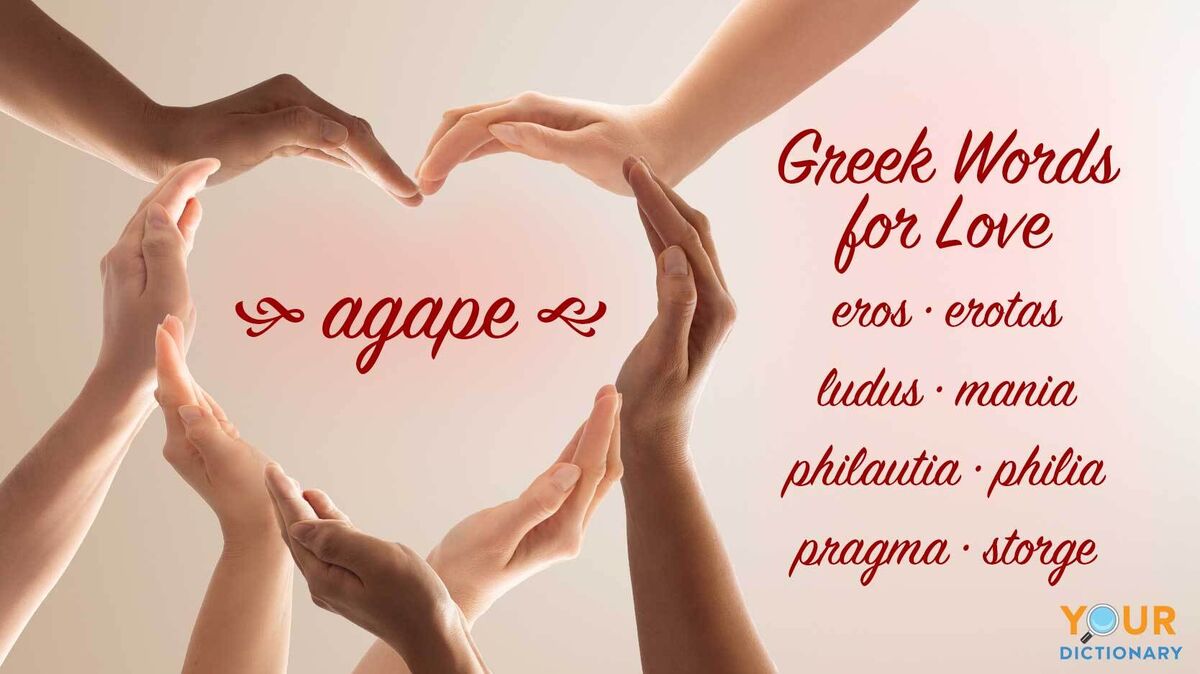
If you're looking for interesting terminology related to love, the Greek language is a fabulous place to start. Discover several Greek words for love and what they mean.
Agape/Agapi (Universal Love)
The ancient Greek word agape is a very general term for love as a universal construct. The modern spelling is agapi. It doesn't refer to love for a particular individual, but to love in a more general sense. This is the love that one might have for every member of humanity. It involves compassion and empathy and is a very encompassing concept. In Christianity, the word agape is used to describe the unconditional love of God toward believers, as well as the love believers have for God.
Eros (Passionate Love)
The word eros is the Ancient Greek term for passionate love that includes deep physical attraction for another person. It is used to describe all-consuming love combined with lust and desire. Eros, the Greek god of fertility is the namesake for this word. If you're looking to write a passionate love letter to that special someone, the word eros is a great term to use to describe how you feel about the one you love and desire.
Erotas (Romantic Love)
The word erotas is modern Greek terminology used to describe romantic love. This term is used to describe the feeling of being in love with another person. If you're looking for new romantic words to express your feelings to the object of your affection, erotas is a perfect choice. It can be appropriate for those who are falling in love, such as newly dating couples, as well as those in longer term relationships.
Ludus (Playful Love)
Ludus is an ancient Greek word that refers to love that is playful in nature rather than serious. It does have a romantic element, but is not serious in nature. This kind of love is more like a flirtation or a crush than a long-term relationship. It's a great way to express loving feelings in a fun and flirty way rather than making a declaration of romantic or enduring love.
Mania (Obsessive Love)
In ancient Greek, the word mania can be used to describe a love that is obsessive. This type of love typically begins with strong feelings of eros that take a dark or destructive path. People who experience this type of love can exhibit extreme jealousy or become obsessively codependent on their partners. It can lead to stalking behaviors or worse, as the person who feels mania is desperate to keep the relationship going.
Philautia (Love of Yourself)
The ancient Greek word philautia refers to the love that a person has for themself. Philautia leads people to take care of themselves, take pride in what they do and have self-esteem. Taken to extremes, philautia can manifest in a destructive form (narcissism). Otherwise, though, philautia is considered to be healthy and a good thing.
Philia (Love of a Close Friend)
Philia is an ancient Greek term used to describe the type of love associated with a strong friendship. Philia can be described as feelings of affection for a close friend. It is sometimes described as brotherly love. (This is why the city of Philadelphia is referred to as the city of brotherly love.) This term describes platonic love rather than romantic feelings, so it's an ideal word to describe a good friendship.
Pragma (Enduring Commitment)
The ancient Greek term pragma refers to committed, long-term romantic relationships. This is the kind of love experienced by partners who are in a strong relationship that will stand the test of time. The partners are in love and will work through problems with an eye toward a shared future together. Lovers who share pragma are patient with one another, show kindness and are willing to compromise.
Storge (Familial Love)
The ancient Greek term storge refers to the love that family members have for one another. It includes the love of parents for their children and the love of children for their parents and siblings. This term is one of many powerful words to describe family.
Expressing Love in Lovely Languages
If you're looking for an interesting way to let someone you love know how you feel, consider using one of these Greek words to express your love. You don't have to stop with Greek, though. Consider coming up with several wonderful ways to express your love in different languages. Start by reviewing how to say I love you in 20 languages for inspiration.